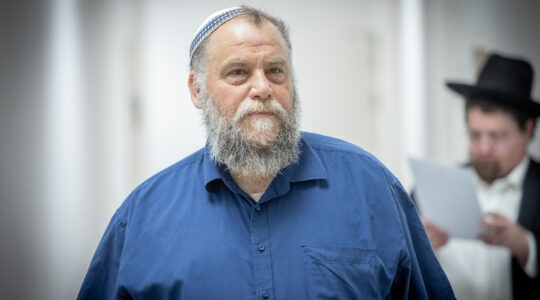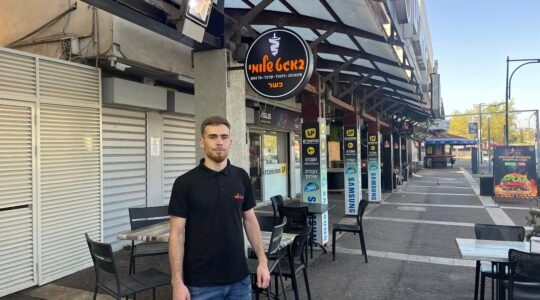KIBBUTZ EIN ZIVAN, Israel (JTA) – In a cherry orchard on the eastern edge of the Golan Heights, Ronen Gilboa waves in the direction of the Syrian border about a mile away and shrugs at the mention of peace talks.
Like many Golan residents who face the prospect of renewed Syrian rule over the territory in a future Israel-Syria peace deal, Gilboa, 45, is unmoved by the news of the relaunched talks between the two adversaries.
“Here we don’t feel anything,” he says dismissively, his eyes squinting in the sun as he looks toward a small Syrian army post across the border. “There is Syria over there and for 40 years it’s been like this. It’s been fine, quiet and peaceful. Let it stay that way.”
Last week’s announcement that the two countries are working toward a peace deal was met more with weariness than concern among Jewish residents of the Golan. They say they’ve seen talk of peace deals come and go, and see little evidence that these latest talks will lead anywhere.
At the cherry orchard, a popular destination for Israeli day-trippers, teenage visitors returning from an afternoon of cherry picking pose for photos while their friends swing in hammocks and a family of geese emerge from a pond.
When the tanks and multiple army bases that dot the Golan are out of sight, the bucolic setting here and elsewhere in the rolling hills and open expanse of the Golan belie six decades of tension between Israel and neighboring Syria.
Romi Moran, 60, sits with her daughter and baby granddaughter, second- and third-generation Golan Heights residents, at a cafe in a recently built strip mall with a food court and a microbrewery on the outskirts of Katzrin, the Golan’s largest town. In Katzrin and in nearby kibbutzim and towns, construction continues on new homes, holiday chalets and another mall.
“I’m very skeptical,” Moran says. “We’ve gone through this before so I don’t get too excited. Every few years there is a big brouhaha, and then everything goes quiet again.”
But Moran, unlike many of her neighbors, says she would be willing to give up the Golan in exchange for a comprehensive peace deal.
“I would be prepared to move out of concern for the future of the next generation,” she said. “There is nothing more important for me than that. We need to have a normal country, one without wars.”
Her daughter, Daniella Levokowitz, 33, a social worker, says she used to think she would be willing to move for the sake of peace. But now, after so many political disappointments, Levokowitz says she is no longer so sure.
“I grew up on peace songs and believed in peace, but after what we have been through – the terror attacks, the failed efforts with the Palestinians, another Lebanon war – it’s hard to imagine,” she said. “If true peace comes I’d be the first to go, but in my heart I just don’t see it happening.
“My friends used to say when babies were born that this child will not have to go to the army, but we’ve stopped saying that now.”
Pessimism was a constant refrain in conversations with Jewish residents of the Golan, who comprise just over half of the Golan’s 40,000 residents. The balance are Druse who publicly pledge allegiance to Syria.
The Golan is a strategically vital, 447-square-mile plateau that overlooks Lake Kinneret and a large part of northern Israel. Since the 1967 Six-Day War, Israel has controlled the Golan, which it formally annexed in 1981.
The Golan’s hiking trails, bed-and-breakfasts and historic sites have made it a popular destination for domestic tourists.
As part of a calculated effort to boost Israelis’ attachment to the Golan, a new $5 million visitors’ center attached to Katzrin’s Kessem Ha’Golan mall showcases the Golan’s breathtaking beauty in a polished film screened in a large theater with plush seats.
The film shows the rushing waters of the tributaries to the Jordan River, cows grazing in a verdant pasture, sun-kissed vineyards, passengers waving from jeep tours, fields of wild purple irises, cowboys galloping through a golden sunset and the snow-capped Mount Hermon, Israel’s only ski area.
Audience members near the end of the film are spritzed by a light mist as raindrops on screen fall slowly to the Golan’s earth.
The idea, says Haim Ohayon, the visitor center’s developer and a Golan resident, is to promote a positive idea of the Golan.
In the past, he says, advocates tried to sell Israelis on the Golan by talking about security, tanks and land mines. The movie has a more positive message that tries to spark Israeli love for the Golan.
Polls show the Israeli public does not need much convincing.
A Channel 2 TV survey conducted last week showed only 22 percent of those polled support a withdrawal from the Golan in exchange for peace; 70 percent oppose.
Many Israelis, Golan residents among them, point to Israel’s 2005 withdrawal from the Gaza Strip as a cautionary tale about the failure to secure peace by handing over land to Arab neighbors.
In the Golan, many locals also see Olmert, currently under investigation on corruption-related charges, as too politically weak to pull off such weighty negotiations.
Media reports about Syria rejecting Israeli demands to break off ties with Iran and militant Islamic groups such as Hezbollah and Hamas, which followed the news of the restarted talks, have further deepened skepticism here that the talks will amount to anything.
But that doesn’t mean those who oppose returning the Golan to Syria are resting on their laurels.
The director of outreach for the Golan’s residents committee, Ramona Bar-Lev, looked tired as she spoke of gearing up for another battle in the Knesset and in the public to thwart returning the Golan to Syria.
Metal closets in the committee’s office are covered with bumper stickers featuring the slogans of previous campaigns: “The nation is with the Golan,” “Peace with the Golan” and “Stop here: Not the Golan.”
Bar-Lev, 57, who moved here from Haifa in 1969, has helped lead several such campaigns together with her husband, who is the mayor of Katzrin.
Echoing many of her fellow Golan residents, Bar-Lev says she hopes a peace deal can be negotiated – but one that would not involve a return of the Golan.
The Golan, she says, is “the most beautiful area of the State of Israel.”





